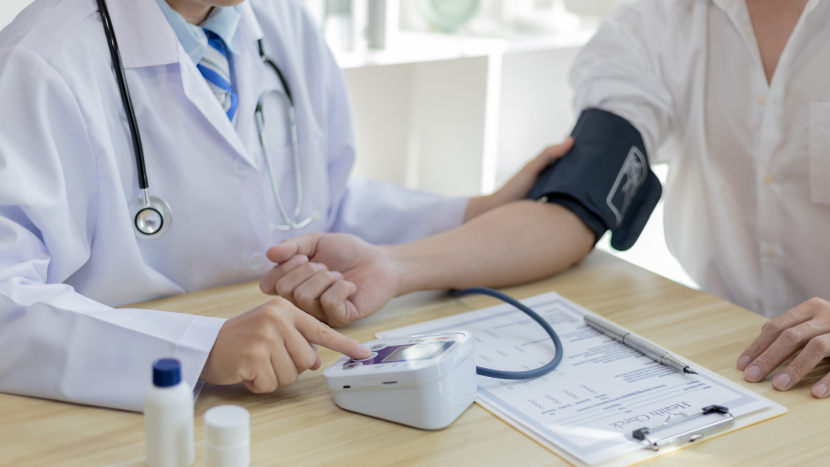Hypertension, or high blood pressure, is one of the most common chronic conditions worldwide. Often dubbed the “silent killer,” it typically doesn’t cause obvious symptoms—yet it quietly wreaks havoc on the body over time. According to the World Health Organization (WHO), over 1.28 billion adults aged 30–79 years globally have hypertension, and more than 700 million are unaware of their condition.
Despite its silence, hypertension is one of the leading causes of heart disease, stroke, kidney failure, and even premature death. So why exactly is it so dangerous?
What Is Hypertension?

Hypertension occurs when the force of blood against the artery walls is consistently too high. Blood pressure readings are expressed in millimeters of mercury (mm Hg) and consist of:
- Systolic pressure (top number): Pressure during heartbeats
- Diastolic pressure (bottom number): Pressure between beats
A normal blood pressure is typically below 120/80 mm Hg.
Hypertension is diagnosed when the pressure reaches 130/80 mm Hg or higher over time.
Why Is Hypertension So Dangerous?
Though it may feel harmless, chronic high blood pressure damages the arteries and organs gradually. Here’s how it affects different parts of the body:
1. Heart: Increased Risk of Heart Attack, Heart Failure, and Arrhythmias

High blood pressure forces the heart to work harder to pump blood. Over time, this causes the heart muscle to thicken (left ventricular hypertrophy), reducing its efficiency.
- Can lead to heart failure
- Increases the risk of coronary artery disease
- Raises chances of heart attack and irregular heartbeat (arrhythmia)
📌 According to the American Heart Association, hypertension is a major contributor to nearly 50% of all heart-related deaths.
2. Brain: Stroke, Aneurysm & Cognitive Decline

The brain needs a steady flow of oxygen-rich blood to function. High pressure can:
- Cause blood vessels to rupture or clot, leading to ischemic or hemorrhagic stroke
- Trigger mini-strokes (TIAs), damaging brain tissue
- Contribute to vascular dementia and Alzheimer’s disease
📌 The CDC estimates that hypertension doubles the risk of stroke in adults.
3. Kidneys: Reduced Function & Failure

The kidneys filter waste from the blood. High blood pressure damages the arteries around them, reducing their filtering capacity.
- Can lead to chronic kidney disease
- May result in dialysis or kidney transplant
📌 Hypertension is the second leading cause of kidney failure worldwide.
4. Eyes: Hypertensive Retinopathy & Vision Loss

Delicate blood vessels in the eyes can burst or thicken due to high blood pressure, resulting in:
- Blurred vision
- Retinal damage (retinopathy)
- In severe cases, permanent blindness
5. Sexual Dysfunction: Impacts on Libido and Performance

Hypertension impairs blood flow, which is crucial for sexual function. As a result:
- Men may experience erectile dysfunction
- Women may face reduced arousal and libido
6. Peripheral Artery Disease (PAD)
Narrowed arteries from long-standing hypertension reduce blood flow to arms, legs, and feet, causing:
- Pain while walking (claudication)
- Slow-healing wounds
- Increased risk of infection or gangrene
Who Is at Risk for Hypertension Complications?
Hypertension, often termed the “silent killer,” can lead to severe health complications if left unmanaged. While it can affect anyone, certain individuals are at a heightened risk due to various factors. Understanding these risk factors is crucial for early intervention and prevention.
1. Age
The risk of developing hypertension increases with age. Men are more likely to develop high blood pressure before age 55, while women are more prone after age 65. This age-related risk is due to the gradual stiffening of arteries and the cumulative effects of lifestyle factors over time.
2. Family History and Genetics
A family history of hypertension significantly raises one’s risk. Genetic factors can influence how the body balances sodium and water, affecting blood pressure levels. Additionally, certain genetic mutations may predispose individuals to hypertension.
3. Race and Ethnicity
Hypertension is more prevalent and often more severe in individuals of African descent. They tend to develop high blood pressure earlier in life and are more likely to experience complications such as stroke, kidney disease, and heart attacks.
4. Lifestyle Factors
Several modifiable lifestyle choices can increase the risk of hypertension:
- Unhealthy Diet: Consuming a diet high in sodium, saturated fats, and low in potassium can elevate blood pressure.
- Physical Inactivity: A sedentary lifestyle contributes to weight gain and increased heart rate, both of which can raise blood pressure.
- Excessive Alcohol Consumption: Drinking too much alcohol can damage the heart and lead to increased blood pressure.
- Tobacco Use: Smoking or chewing tobacco immediately raises blood pressure temporarily and contributes to artery damage over time.
- Stress: Chronic stress may lead to temporary increases in blood pressure and encourage behaviors that elevate blood pressure, such as poor diet and alcohol consumption.
5. Medical Conditions
Certain health conditions can increase the risk of hypertension and its complications:
- Chronic Kidney Disease: Damaged kidneys can lead to fluid and sodium retention, raising blood pressure.
- Diabetes: High blood sugar levels can damage blood vessels and the nerves that control the heart, increasing blood pressure.
- Sleep Apnea: Interrupted breathing during sleep can lead to increased blood pressure and strain on the cardiovascular system.
6. Pregnancy-Related Factors
Some women may develop high blood pressure during pregnancy, a condition known as gestational hypertension. This can increase the risk of complications for both mother and baby and may lead to chronic hypertension later in life.
Global and Indian Scenario
- As per WHO, about 46% of adults with hypertension are unaware they have it.
- In India, studies show that 1 in 3 adults has high blood pressure, and control rates remain low—especially in rural areas.
This is a major contributor to rising cases of cardiovascular diseases, stroke, and kidney disorders in the country.
How to Prevent or Manage Hypertension
The good news? Hypertension is highly preventable and manageable. Here’s how:
1. Eat Smart
- Follow the DASH diet (Dietary Approaches to Stop Hypertension)
- Focus on fruits, vegetables, low-fat dairy, whole grains
- Reduce sodium (less than 5g/day), saturated fats, and sugar
2. Get Active
- Aim for 30 minutes of moderate activity (like brisk walking) 5 days a week
- Regular exercise helps reduce systolic blood pressure by up to 10 mm Hg
3. Maintain a Healthy Weight
- Even a 5% reduction in body weight can significantly lower your blood pressure
4. Quit Smoking and Limit Alcohol
- Smoking increases blood pressure and damages arteries
- Limit alcohol to 1 drink/day for women and 2 drinks/day for men
5. Reduce Stress
- Try yoga, deep breathing, mindfulness, or spending time in nature
6. Medication (If Prescribed)
- Common classes: ACE inhibitors, beta-blockers, calcium channel blockers, diuretics
- Never stop medications without consulting your doctor
When to See a Doctor
- Regular health check-ups are crucial
- You should monitor your blood pressure at least once a year or more often if you are at risk
Final Thoughts
Hypertension is not just a number on a machine—it’s a major threat to your health if left unchecked. Its nickname, “silent killer,” reminds us how crucial it is to catch it early, treat it effectively, and commit to long-term health changes.
Remember: High blood pressure doesn’t make noise—but the damage it causes can be deadly.




